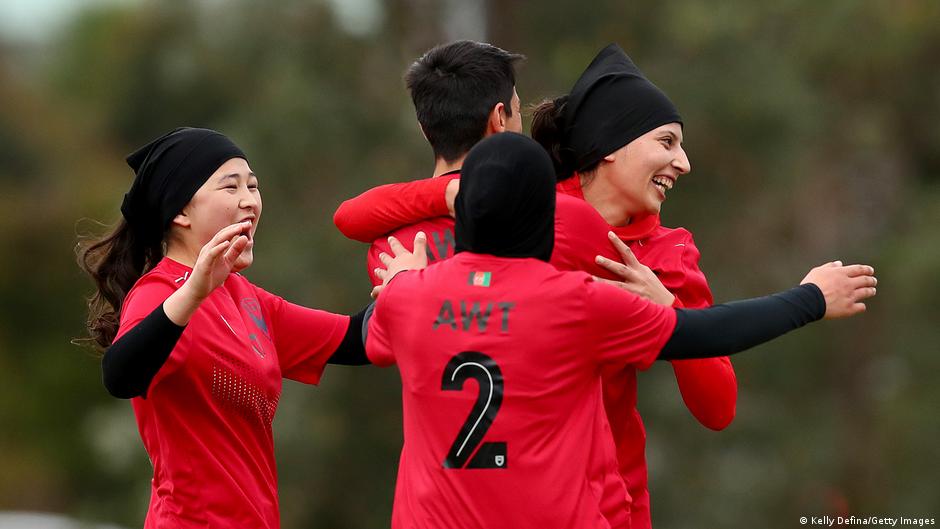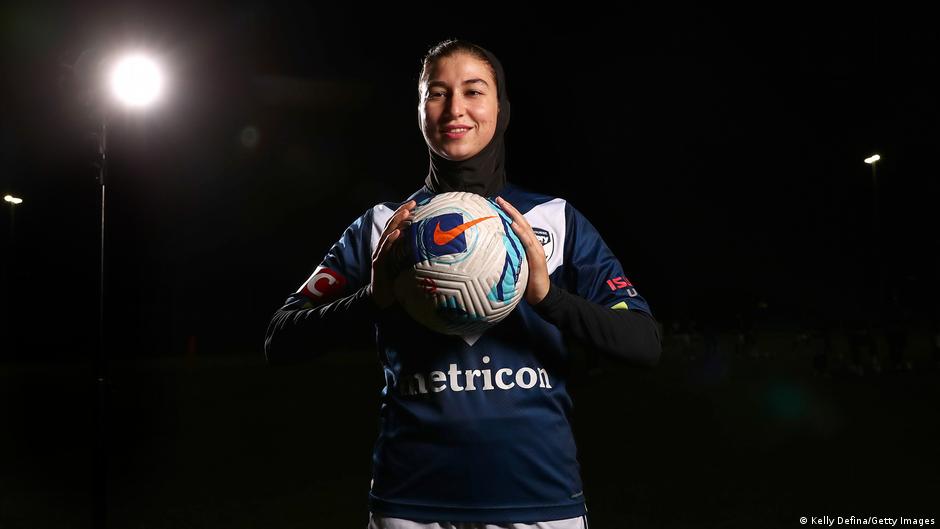The national women's football team that isn't

The team is "like a second family in a strange country," says defender Fatima Mursal Sadat. Until a year and a half ago, when the Islamist Taliban took power in Kabul again, Mursal Sadat was a national team football player for Afghanistan. And in a way, she still is. After all, the 20 year-old wears the Melbourne Victory FC AWT shirt – the last three letters standing for "Afghan Women's Team".
A year ago, the Australian club gave Mursal Sadat and her compatriots a new sporting home to "support the Afghan women's national team in their return to football". Since then, the Afghan women have played in the seventh Australian league. "With all the help we've received, we've settled in well in Australia," says Mursal Sadat. "Life is not too good or too bad because we all are struggling with our family cases and supporting them emotionally and financially."
When Kabul descended into chaos after the Taliban seized power in August of 2021, the Australian government evacuated the Afghan national players. They were in acute danger, because self-confident, educated and football-playing women like Mursal Sadat do not fit into the Taliban's worldview.
Removed from FIFA rankings
With their flight from Kabul, the Afghanistan women's national team ceased to exist, according to football's governing body FIFA and to the Asian Football Confederation (AFC). Afghanistan have not featured in the FIFA women's team rankings since early 2022. The AFC also recently withdrew the country from the women's Olympic qualifiers for Paris 2024, which begin next April.
Congratulations to our champs for winning the first game of the season with @gomvfc football is a beautiful game that brings, joy, happiness, and unity and helps to think about something then the trauma. The former Afghan senior wnt in Melbourne. #UNBREAKABLETogether pic.twitter.com/Lo8YFYBDSZ
— Afghanistan Women's National Football Team (@AfghanWnt) March 5, 2023
At the end of February, a statement by the Afghanistan Football Federation (AFF) caused a stir when it announced the formation of a new women's national team and invited Afghan women living abroad to apply. Apparently, the person still officially listed as the AFF media director, now living in Albania, was responsible for the statement and had the support of FIFA. "The announcement was taken down by the federation," says Khalida Popal, a former team captain. "And the federation made announcements on local media that nobody outside Afghanistan can represent them, and they have no plan to re-create the Afghan women's national team."
Popal became the first captain of an Afghan national women's football team in 2007. In 2018, she and at least four other female players accused then-AFF President Keramuddin Keram of repeated sexual assaults. FIFA banned later Keram for life after investigating the accusations. Meanwhile, Popal has lived in Denmark for years and has used her organisation "Girl Power" to help refugee women gain more self-confidence and independence through sports.
In 2021, it was Popal and her organisation who orchestrated the evacuation of the Afghan national team to Australia. In early January, Popal and Afghan Nobel Peace Prize winner Malala Yousafzai co-authored an article in the British newspaper The Guardian calling on FIFA to officially recognise the Afghan team in exile in Melbourne as the national team of Afghanistan.
Popal: '...it was all for nothing'
"It would mean the world to me and my team here if we could get clearance from FIFA to represent our country and see the Afghanistan flag fly among other countries," says Mursal Sadat. "We and the women who played soccer before us made lots of sacrifices on this path and we did not play with our lives to quit soccer after a while. We did it to play soccer again and show the world that an Afghan girl can fight for her dreams and goals."
Khalida Popal, on the other hand, sounds disillusioned. "As one of the players who played in the very first national team of Afghanistan and fought hard with my teammates to make history and make women's football part of the culture in Afghan society, it's sad to see now it's fading away and it was all for nothing," she says. "I was expecting more from FIFA and sports governing bodies, but once again they've shown women's football is always the second and not the priority."

FIFA silence
Popal is particularly angry that FIFA did not even consider it necessary to respond to repeated requests from the team in Australia, and to Popal's and Yousafzai's initiative. "It's a shame that the organisation that has been calling itself the governing body of football has not yet come up with a single statement to at least stand in solidarity with the players. By staying silent FIFA is indirectly supporting the decision of the Taliban, telling women that they belong in the kitchen."
A request to FIFA for comment has also gone unanswered. Deutsche Welle asked FIFA why it is not taking any action against the Afghanistan Football Federation. Article 4 of the FIFA Statutes threatens, among other things, the suspension or even expulsion of an association in the event of gender discrimination. According to Popal, female footballers in Afghanistan are still in danger: "We still have our U15 national team stuck in Afghanistan," says the 35-year-old.
Fatima Mursal Sadat is also in contact with players in her home country who have asked her and Popal for help. "I feel so guilty when I can't help them and there's not much I can do. I'm doing my best to be their voice and raise their voices to the point where the whole world can see what is going on there," she says.
"I have lots of dreams for my future and the most important one is to play for the Afghanistan national team once again and see Afghanistan as an unrestricted country."
Stefan Nestler
© Deutsche Welle 2023
